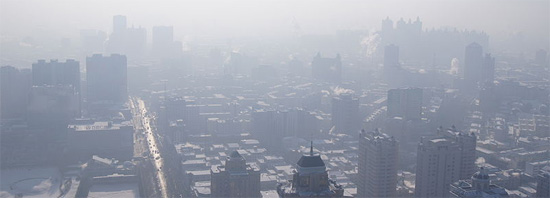In the 60’s and 70’s, we passed a lot of environmental laws that made manufacturing here more expensive. Since then, policy and technology have made globalization more feasible. Arguably, the latter policy has undermined the rationale of the former policies. Which is to say, manufacturing in China has resulted in more of the pollution that American laws sought to alleviate. The view in China isn’t pretty:
Harbin, the capital of Heilongjiang Province and home to 11 million people, registered fine particulate (PM2.5) pollution levels beyond 500, the top of the scale on the Chinese Air Quality Index, a level which is considered hazardous to human health. Measurements in some parts of the city reached 1,000 micrograms per cubic meter. As a result, authorities forced primary and middle school closures and the shutdown of the airport and local highways.
By contrast, Los Angeles, where I am now based and which typically has some of the worst air quality in the U.S., had U.S. Environmental Protection Agency AQI levels for PM2.5 between 48 and 108.
And a whole lot of it is our fault. Meanwhile, despite a scramble to do something about it, China is projected to use almost 3% more coal this year than last year. When we talk about what we need to do globally about carbon emissions and global warming, it’s hard not to consider China. On what basis would we be able to demand that they sacrifice their exploding economy for our air? The more straightforward solution, to tax imports on the basis of the pollution caused by the source country, is anathema to current business, economic, and policy theory.
All of which is washing back onto American shores:
Pollution from China travels in large quantities across the Pacific Ocean to the United States, a new study has found, making environmental and health problems unexpected side effects of US demand for cheap China-manufactured goods.
On some days, acid rain-inducing sulphate from burning of fossil fuels in China can account for as much as a quarter of sulphate pollution in the western United States, a team of Chinese and American researchers said in the report published by the US National Academy of Sciences, a non-profit society of scholars.
Cities like Los Angeles received at least an extra day of smog a year from nitrogen oxide and carbon monoxide from China’s export-dependent factories, it said.
One of the things I have a hard time squaring with the desire to reduce energy consumption for the sake of the environment is how utterly addicted the world is to energy. It’s not unlike some folks on the left who speak almost triumphantly about Peak Fossil Fuel. That could be good for the environment, but I can more easily imagine how it will be bad for the environment in other ways. Our addiction to energy is such that the more desperate we will become, the less we will let anything stand in the way of extraction. Including the air, the water, and the land.
At this point, our only real hope is that renewables and nuclear will be able to affordably satisfy that addiction. Subsidies could help the technology become cheaper, but mostly on a short and medium term basis because at some point cost will be cost and it will likely become more important than the existence of Florida.
About the Author
2 Responses to We’ve Outsourced Our Pollution to China, And They’re Shipping It Back
Leave a Reply to trumwill Cancel reply
please enter your email address on this page.


I was in China in ’95, and the air was already unbreatheable (except in Shanghai, where it was relatively okay), maybe even worse that Kabul, although I was younger then and it didn’t bother me as much. I hate to think what it’s like now.
The pictures are pretty astonishing.